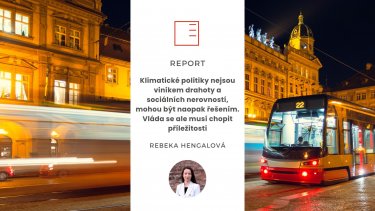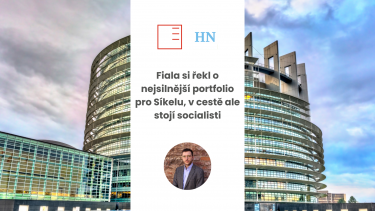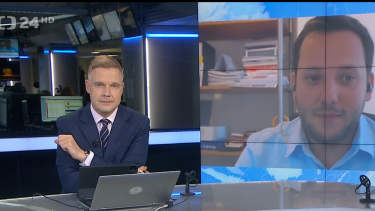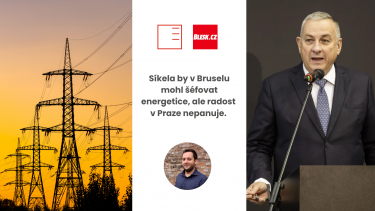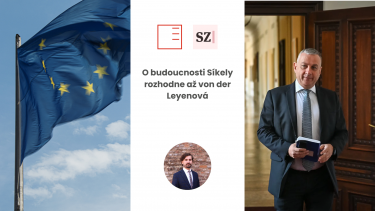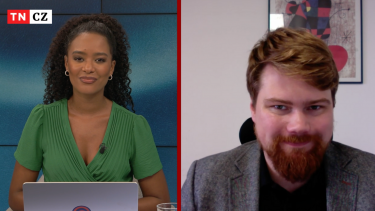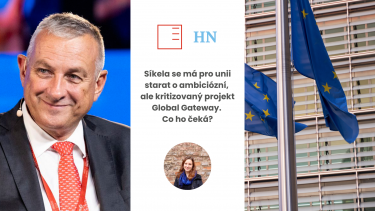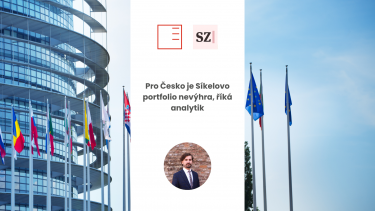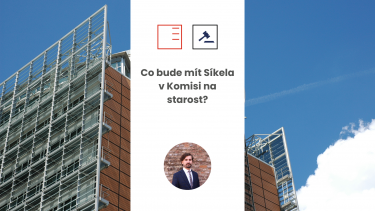Report | Climate policies are not the culprit of high costs and social inequalities, but can be the solution. But the government must seize the opportunity
This week, the Government will discuss in the third reading an amendment to the Emissions Trading Act, which also includes so-called household allowances. Under ETS2, these will charge for emissions from road transport and local heating - so they can help invest in infrastructure, renewable energy and support socially vulnerable groups. EUROPEUM Institute research fellow Rebeka Hengalová and others write.
Show moreHospodářské noviny | Fiala asked for the strongest portfolio for Síkela, but the Socialists are in the way
Petr, business or defense? This was the question posed to Prime Minister Petr Fiala by European Commission President Ursula von der Leyen. Fiala replied that he wanted trade. Filip Křenek, an analyst at EUROPEUM Institute, commented for Hospodářské noviny.
Show more
ČT24 | Síkela could be EU Trade Commissioner
Ursula von der Leyen will present the new EU Commissioners list on Wednesday 18 September. The President of the European Commission may come with a new portfolio that has not been there before. Until then it is not sure what portfolio will Jozef Síkela get. Whether it would be the wanted trade discussed Žiga Faktor, deputy director of EUROPEUM Institute and head of the Brussels office, live on ČT24.
Show more
Blesk.cz | Síkela could head the energy sector in Brussels, but there is no joy in Prague now
It looked like a real victory by the Czech EU negotiators. At least the German Die Welt presented it almost as a fait accompli that the influential post of EU Energy Commissioner was to be taken by the Minister of Industry and Trade Jozef Síkela. For Blesk daily commented Deputy Director and head of Brussels office of EUROPEUM Institute Žiga Faktor.
Show more
Seznam Zprávy | The future of Síkela will be decided by von der Leyen
Commission President von der Leyen will announce the distribution of the portfolios for the European Commissioners soon. According to speculations, Jozef Síkela could get Energy portfolio, the trade area is also in play. But it could still change. Deputy Director at EUROPEUM Institute Viktor Daněk commented for Seznam Zprávy.
Show moreTN.cz | New Commissioner Síkela. Big budget, less influence
Czech Minister of Industry and Trade Jozef Síkela has been appointed Commissioner for International Partnerships at the European Commission. Martin Vokálek, Executive Director of EUROPEUM Institute, commented on TN Live whether this is a win or a loss.
Show more
Hospodářské noviny | Síkela is supposed to look after the ambitious but criticized Global Gateway project for the EU. What awaits him?
The new composition of the European Commission and the distribution of portfolios caused puzzlement in Prague. The head of the Commission, Ursula von der Leyen, entrusted Jozef Síkela with the agenda of International Partnership and Global Gateway – a name that, apart from a handful of insiders in the Czech Republic, few people have heard of, instead of the long-talked about energy sector or international trade. EUROPEUM Institute analyst Zuzana Krulichová commented for Hospodářské noviny.
Show more
Aktuálně.cz | A surprising portfolio "swap". The French could have played a role, says expert on Síkela
Despite previous speculation, the Czech candidate for the new European Commission and current Minister of Industry and Trade Jozef Síkela will be put in charge of the International Partnership portfolio by Ursula von der Leyen. The government sees this as a "mission accomplished", but the opposition as a failure. Experts are not sure whether this is a success for the Czech Republic. Why the Trade portfolio eventually went to Slovakia? Filip Křenek, project coordinator and analyst at EUROPEUM Institute, commented for Aktuálně.cz.
Show more
Seznam Zprávy | Síkela's portfolio is a loss for the Czech Republic, says analyst
Instead of trade or energy, the current Minister of Industry and Trade, Jozef Síkela, will eventually be put in charge of International Partnerships in the European Commission. According to the opposition, this is a failure of the domestic government, but the Prime Minister and other leaders of the five-coalition praise Síkela's portfolio. So how did the distribution of the seats of the European Commissioners work out for the Czech Republic? Viktor Daněk, deputy director of EUROPEUM Institute, commented for podcast 5:59 of Seznam Zprávy.
Show moreČeská justice | What will Síkela be responsible for in the Commission?
Disappointment with the negotiations and the weak position of the Czech Republic was voiced when the new composition of the European Commission was announced. The presentation of the post to the Czech nominee Jozef Síkela is accompanied by a debate on how influential the position of Commissioner for International Partnerships is. Experts say that although the government had bigger expectations, much can be achieved even with the portfolio at hand. The current Trade and Industry Minister could help the EU to be a counterweight to Russian and Chinese influence in emerging economies, and could also push for greater raw material security. For daily Česká justice commented Viktor Daněk, Deputy Director of EUROPEUM Institute.
Show moreStaroměstské náměstí 4/1
Prague 1 - Staré Město
110 00
tel.: +420 212 246 552
email: europeum@europeum.org
https://www.europeum.org
